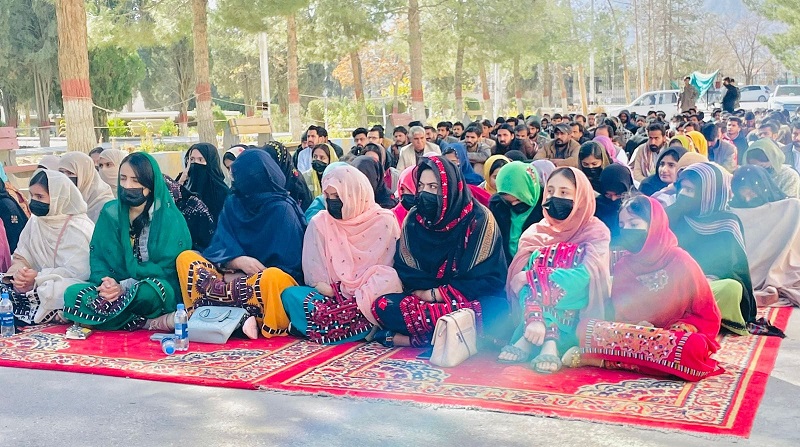Indian State Should Focus on Unconventional Methods: Jamal Nasir Baloch
Balochistan: Seminar at Bolan Medical College Over Militarisation and Student Rights

QUETTA: For the past twelve days, a protest camp has been ongoing at Bolan Medical College (BMC), as students and activists rally against militarisation, harassment, forced disappearances, and the closure of hostels in Balochistan’s educational institutions. The protest, organised by student unions and political groups, highlights the pressing issues facing students in the region.
Today, a seminar was held at the protest camp, with large participation from various students, parliamentary parties and political activists. The event was a platform to discuss the challenges faced by students, the militarisation of institutions, and the lack of academic freedom. The seminar included speeches, panel discussions, and a tableau depicting the ongoing struggles.
The seminar was attended by prominent figures, including Dr. Mahrang Baloch, the central organiser of the Baloch Yakjehti Committee (BYC) and representatives from different political parties across Balochistan. The event began with the Baloch National Anthem, followed by an opening speech by Rafiq Baloch, the Vice Chairman of BSAC (Baloch Students’ Action Committee).
One of the key discussions focused on the closure of hostels at BMC and the police occupation of the college premises. The panel, moderated by Beebgar Baloch, Zonal Information Secretary of BSAC, featured BMC students who shared their experiences and concerns regarding the hostile environment at the college. They emphasised how these actions have disrupted the academic schedule and impacted students’ lives.
The seminar continued with a second-panel discussion on the role of political activists in mobilising the public for educational reforms in Balochistan. The debate, moderated by Fahad Baloch, President of BSAC Shal Zone, saw participation from political leaders such as Advocate Sadia Baloch from the Baloch Unity Committee, Dr Samia Baloch from the Baloch Women’s Forum, Ali Jan Maqsood Baloch from the National Democratic Party, and Zubair Shah Agha from the Pashtun Tahafuz (Protection) Movement (PTM). They shared their views on how political activism can contribute to educational reforms in the region.
A third-panel discussion featured members of Balochistan’s parliamentary parties, who engaged in a dialogue about the role of parliament in addressing the issues faced by students. The debate, moderated by Atif Baloch of the Baloch Students’ Organization (BSO), included Dr Ishaq from the National Party, Ghulam Nabi Marri from the Balochistan National Party, Abdul Bari Kakr from the Awami National Party, and Nasrullah Zaire from the Pashtoonkhwa National Awami Party. They debated the need for policies that protect students’ rights and academic freedom.
A powerful moment in the seminar came with a silent tableau presented by BMC students, symbolising the disruption of academic life caused by the state’s interference and closure of educational institutions. The tableau also illustrated the broader impact of state policies on universities and colleges across the region.
The seminar concluded with remarks from Shabbir Baloch, Chairman of BSAC, who reiterated the students’ demands for the immediate reopening of hostels and restoration of academic schedules at BMC. He called on the responsible authorities to listen to the student’s concerns, warning that students would continue to exercise their constitutional rights to protest if their demands were not addressed.
Throughout the seminar, panellists unanimously emphasised the need to end the militarisation of educational institutions and restore academic freedom. They called for the immediate reopening of hostels at BMC and other colleges in Balochistan, urging the government to act swiftly before the situation escalates further.
As the protest continues, students remain determined to secure their rights and ensure that their voices are heard by the government. The ongoing demonstrations have drawn significant attention to the challenges faced by students in Balochistan, highlighting the need for systemic reforms to protect educational institutions from political interference and militarisation.









